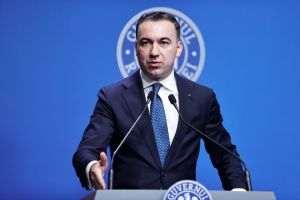THE PRESS RELEASE OF THE BSE
In response to the statement of the Vice-president of the Financial Oversight Authority (ASF) concerning the question whether the CEO of the Bucharest Stock Exchange (BVB) is a member of its staff, within the meaning of the internal regulations of the Company, on April 8th, 2014, the CEO of the BSE, addressed a letter to the Vice-president of the ASF. We hereinafter quote, by reproducing several fragments of this letter, the arguments which prove that, in light of the internal regulations of the BSE, including its Articles of Incorporation, the two managers of the company CAN NOT BE CONSIDERED members of the staff of the BSE:
1. There is no provision in the existing legislation, the articles of incorporation of the BSE or in its internal regulations (including the Organization and Operation Regulation - ROF) that stipulates that the CEO (and the deputy CEO) are members of the Staff. This is important when it comes to restrictions or prohibitions imposed on the CEO, because not all restrictions should be interpreted broadly.
2. Second of all, [...] the Articles of Incorporation of the BSE expressly mention the existence of two distinct categories, the staff and the managers of the BSE. This is clearly expressed through the very title of Chapter V of the Articles of Incorporation: "Chapter V. The Staff of the Company. The managers of the company". This terminological and material separation is clearly visible throughout that entire chapter.
3. One of the obligations of the CEO of the BSE is stipulated in art. 14 (3) of the Regulation concerning the Organization and Operation - of the BSE (ROF): "The CEO-manager fulfills the roles of organization, management and those pertaining to the operation of the BSE, including those concerning the hiring and compensation of the staff [...]", which also confirms, in this context, the difference between the Staff and the CEO.
4. Moreover, the Regulation concerning the Organization and Operation of the BSE, in perfect agreement with the Articles of Incorporation, stipulates a definition of the Staff, specifically in art. 17 (1): "The staff of the BSE can be hired using individual labor contracts /.../". It is needless to say that the CEO can not be considered an employee. Also, my agency contract expressly states that I am NOT an Employee of the BSE.
5. The above definition explains why in most cases the notions of Staff and of Employees are equivalent. The most obvious expression of that fact, which confirms that three distinct groups exist, is stipulated by art. 66 (1) of the Regulation for the Organization and Functioning of the BSE, which interposes "the executives" between "all the employees" and the members of the Board of Directors.
6. Therefore, art. 99 of the Regulation for the Organization and Operation, undoubtedly refers to the Staff, and not to the CEO and the Deputy CEO. The opposite interpretation would mean that art. 99 violates the Articles of Incorporation and contradicts the definition of Staff as stipulated in the Regulation.
THE OPINIONS OF THE LAW FIRMS
• Eliza Poponeci: "The interpretation of the notion of staff made by the CEO of the BSE is flawed"
The interpretation of the notion of staff made by the CEO of the BSE is flawed, given the principles of humanity and the equality of employees in the workplace, says lawyer Eliza Poponeci, a member of law firm Coltuc.
She told us: "The CEO is a salaried employee of the organization, and together with the deputy managers (deputy CEOs, deans etc.), is part of the top management, and is in charge of the organization as a whole and of the activity of the middle managers. In turn, the General Manager answers to the Board of Directors.
It's true that CEOs are part of the management staff, but they do have to obey the same internal regulations that other employees do.
The upper level management staff is made up of general managers, deputy general managers, directors and main advisors.
The CEO holds the highest position in most organizations, especially in companies.
In other organizations, the equivalent position is that of president (in banks, TV companies, in political parties, in athletic clubs etc.), provost (in universities), principal (in pre-university educational institutions) etc.
The internal regulations of the institutions generally comprise clauses that mainly apply to the executives, as they hold a special status.
The press release of the Bucharest Stock Exchange is flawed precisely because of its specific interpretation of the articles comprised in the Articles of Incorporation, as no clause which stipulates the difference between the employees and the management exists. The distinction concerns only their designations.
The statement of the vice-president of the Financial Oversight Authority is disputed through the letter of the CEO of the Bucharest Stock Exchange, by indicating some articles in the Articles of Incorporation which do not clearly prove that the CEO is not part of the staff of the institution".
• Duţescu: "The CEO is a subdivision of the < staff > category"
Lawyer Cristian Duţescu, specialized in the stock market, considers that there are no legal arguments that are strong enough to justify not enforcing the provisions of art. 99 of the Regulation for the Organization and Functioning of the BSE (which prohibits the staff from buying shares in the Bucharest Stock Exchange) in the case of BSE executives.
He sent us the following opinion: "Even though, starting with December 4th, 2006, the Law no. 31/1990 stipulates the fact that executives are governed by the provisions of art. 137/1 paragraph 3 of the Law which stipulates that the managers must enter an agency agreement with the company, and the labor contract is suspended for the duration of the agency agreement, the special legislation, namely art. 18. paragraph 2 of Regulation no. 2/2006, has remained in effect. The latter makes it mandatory for the managers of a market operator to conclude an individual labor contract with the market operator. The new law, meaning Law 31/1990 (amended in December 2006 and in 2007 concerning agency agreement) did not explicitly or indirectly abrogate the old regulation, that of Reg. 2/2006, even though the latter has a lower legal weight. It is true that from the logical systematical interpretation of articles III and IV of Government Emergency Ordinance 82/2007 (the one which amends Law no. 31/1990) it follows that the executives of a company are only allowed to operate through agency agreements and not through employment ones, but the essential problem is that of the application of the special, overriding regulation, even if it precedes the new regulation of general applicability. In the absence of an explicit exemption, through the Laws which amend the Law no. 31/1990, only the CNVM/ASF as the issuer of the act was supposed to partially abrogate art. 18 paragraph 2 of the Regulation no. 2/2006. The discussion is all the more interesting because, in the case of the SSIFs (brokerage firms), even the law 297/2004 which regulates the stock market has the following provision art. 14 paragraph 1 thesis II:
"The executives must be employed by the brokerage firms (SSIF) using individual labor contracts and they may serve on the Board of Directors", which means that if the main lawmaker - the Parliament - didn't feel the need to repeal in 2006 all the stipulations which go against the legal relations between the executives and the company and has allowed this provision to remain a part of the Law no. 297 in the case of the brokerage firms, mutatis mutandis this would imply that it did not intend to amend special norms which require the existence of a labor contract between the manager and the company. Therefore, until art. 18 paragraph 2 of the CNVM Regulation no. 2/2006 is repealed or annulled, it would seem that the CEO - manager of the BSE must sign an employment contract with the BSE. In reality, that didn't happen...
In the absence of a legal or statutory definition, or within the Regulation of the notion of "BSE staff", the study of the Regulation does not lead to the conclusion that there would be a dichotomy between the CEO and the staff. It is true that the Regulation does contain some stipulations that apply to "staff" and others that apply to "CEOs". In fact, the CEO is a division of the "staff" category. The old version of art. 99 of the Regulation was clearer in that regard, because paragraph 1 contained the expression "The members of the staff of the BSE, others than the executive management of the BSE, may not own...", which led to the conclusion that was beyond doubt that the executive managers were not part of the staff.
Art. 17 of the Regulation of the BSE, used as an argument in the press release, is not an imperative regulation, meaning that it does not imply that all the members of the staff must have an employment contract. Besides, excluding the applicability of art. 18 paragraph 2 of the Regulation 2/2006 previously reviewed, from the study of the Regulation of the BSE it follows that the notions of "employee" and "person that has an employment contract" are not identical. According to art. 16 paragraph 3/1 of the Regulation the deputy CEO is an employee of the BSE, but according to art. 12 he is also an executive, and, like the CEO, he is in charge of managing the company. The law 31/1990 requires however, like we have seen previously, the individuals who have been tasked with the management to sign an agency agreement. I don't know what kind of contract the deputy CEO of the BSE currently has, but he is not allowed to receive a different legal treatment than the one applicable to the CEO. This means that either they both have an agency agreement and the BSE does not follow the provisions of art. 18 paragraph 2 of Regulation 2/2006, or they would both be required to have an employment agreement, based on the provisions of that article.
Therefore, in the absence of some clear dispositions in the Regulation for the operation of the BSE, the articles of incorporation of the BSE, the regulations of the ASF, there are no legal arguments that are strong enough to justify why art. 99 of the Regulation of the BSE should not apply in the case of executives.
In my opinion however, and I would like to emphasize this, any restriction of this nature, applicable to the employees, or to the managers, goes against the spirit of a free market and even against the best interests of the BSE. There is a clearly defined legal regime of the abusive use of inside information and of manipulation, which becomes applicable anyway if an employee of the BSE trades in a manner which can be considered market abuse. I think that quite the opposite, it would be a good thing if the employees and the executives owned as many shares issued by the company they work for as possible. Under the current regulation, no stock option plan or any other programs for incentivizing the employees can be implemented at the BSE, which is bizarre at the very least. The EU legislation contains no such limitations".
• Gheorghe Piperea: "The press release of the BSE contains a legal speculation that is easy to refute"
Lawyer Gheorghe Piperea has also reviewed the interpretation made by the CEO when it comes to the notion of staff of the Bucharest Stock Exchange.
He told us: "The press release of the BSE contains a legal speculation that is easy to dispute.
The CEO of a company, meaning the CEO of the BSE as well, is not only the agent of the company, but also the executive of the company, the one who handles its business and actions. See art. 142, art. 143 and art. 143-1 of the law no. 31/1990 of companies, wherefrom it follows that: (i) the executives are conducting the line of business of the company (the company's business); (ii) the management of the company can be delegated to the executives, of which one may be the CEO; (iii) if the board of directors has delegated the management roles from the board members to the executives, then the latter are the ones conducting the company's line of business. The company's business is therefore achieved, conducted, handled (whatever term Mr. Sobolewski wants to use) by the CEO.
As agent of the company, the CEO represents the company in its relations with third parties (art. 143-2 paragraph 4 of the Law no. 31/1990).
The agency notion involves: (i) two parties holding equal positions, in other words, in this specific case, the company which is the principal and the CEO who is the agent; (ii) the obligation of the agent to conclude legal acts on behalf and in the name of the principal as well as the obligation of the agent to answer to the principal.
The legal notion of the company executive involves: (i) the fact that all the employees of the company, in other words all of its staff, are subordinated to the company executive; (ii) the business of the company is conducted by the executive of the company, through its staff.
Thus, not only is the CEO, viewed as an executive, part of its staff, but, even more than that, he is the head of the entire staff.
Hence the interpretation presented on the website of the BSE concerning the notion of employee, which allegedly the executive, in other words the CEO, is not, is artificial and flawed. If a restriction, an incompatibility or obligation to refrain from certain activities or actions that would put him in conflicts of interest, is applicable to any manager or CEO, these restrictions, incompatibilities or conflicts of interest apply to the CEO, who is the head of the staff, all the more so".



























































